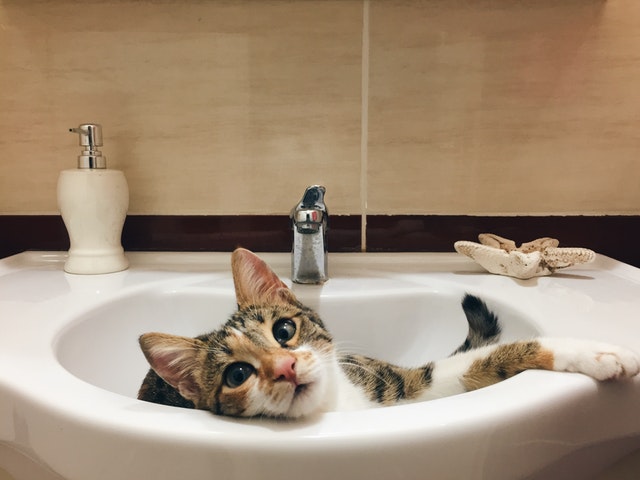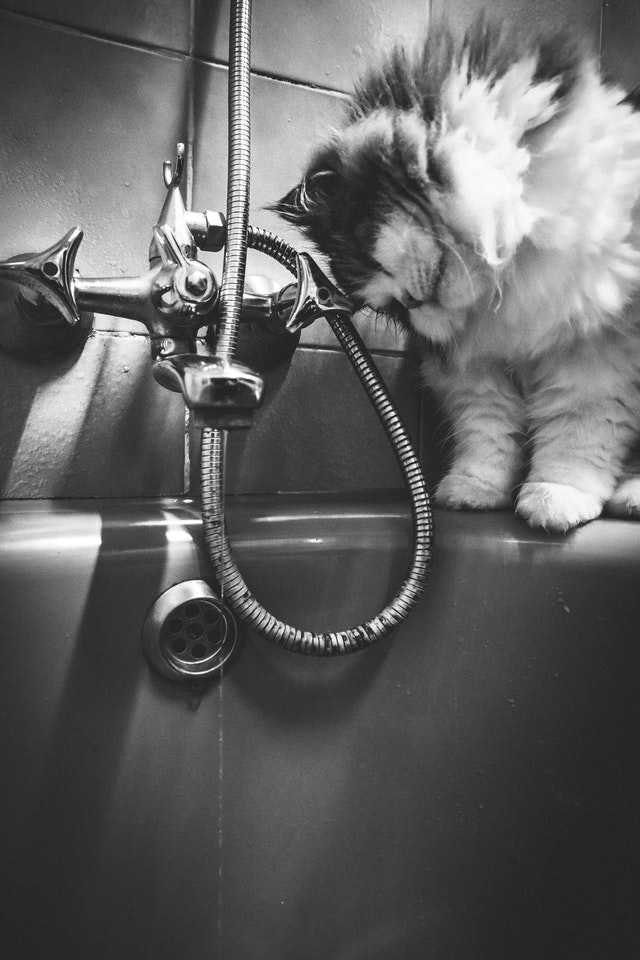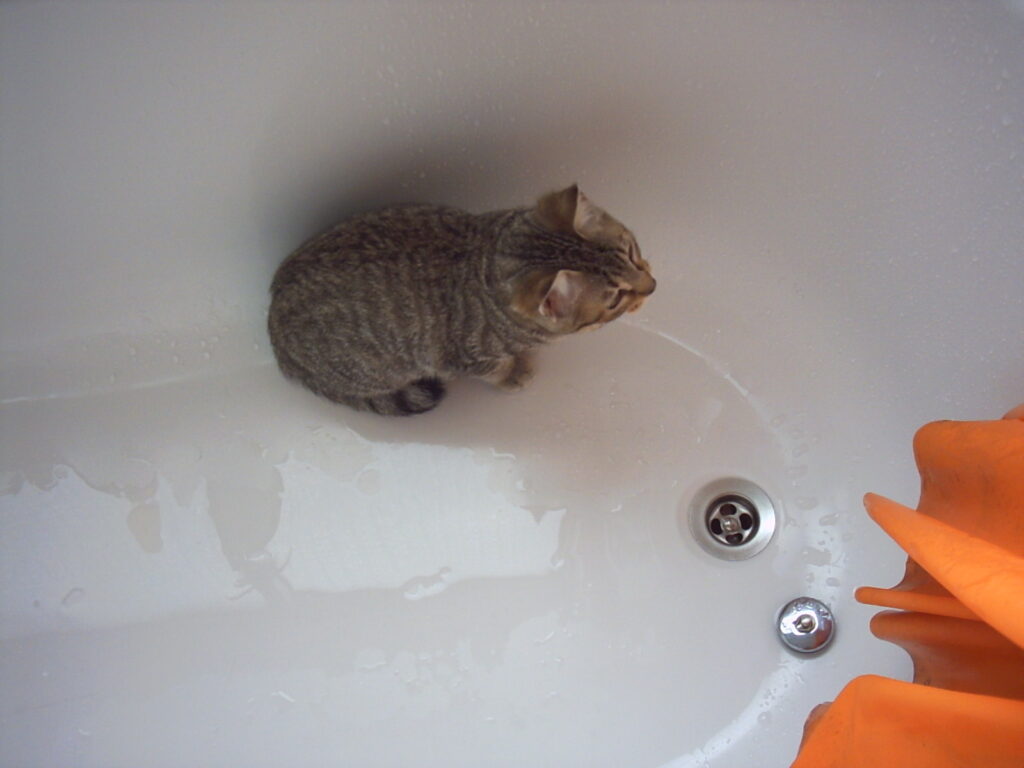Bathing is an essential part of your cat’s life to keep its coat and skin healthy and good-looking. However, as we all cat owners know, most cats tend to be aggressive or skittish during bathing just because they don’t like it. In the end, both of you opt to skip the vital grooming activity altogether.
One way to curb this behavior is by making a routine and starting them early. This will greatly help in reducing the stress and tension that your water-fearing friend feels during bathing.
For this post, we’ll talk about how often you should bathe your cat, do you really even need to bathe them, tips on how to bathe them, and the benefits of keeping your cat clean.
Should I bathe my cat?
Although cats are already good at cleaning themselves, they still need to be bathed. They may brush off their loose hair, massage their hair roots, and evenly distribute their natural skin oils, but it does not make them human-standard clean because not all the sticky dirt, stinky smell, and dandruff go off easily. Because of this, they need their humans to keep their coats and skin healthy and clean.

However, the frequency of how often you should bathe your cat is another important topic that will be tackled later in this article. As a quick answer, bathing too often can cause flaky and dry skin. You should also know that if cats get used to being in the water from a young age, bathing will not be a stressful grooming routine for them.
Tips on bathing a cat
Now, let’s talk about how to bathe a cat properly. Following these tips will make bathing your cat a less tiring and stressful experience for you and your cat.
1. Tire out your cat
Bath time will be hard for you if your cat is full of energy. Therefore, before putting your feline friend anywhere near water, make sure that they are tired by playing with them, or you can also have them tire themselves out by letting them play with a variety of toys.
2. Brush your cat often
Regular brushing is important in helping your cat with their grooming. By brushing them once or twice a week, the amount of loose hair that you will have to remove during bath time will significantly decrease, thus saving your time as well.
3. Trim your cat’s nails
Aside from bathing and brushing, regular trimming of nails is also important in your cat’s overall health. Moreover, keeping their nails short will save you from painful scratches especially when you try them to get into the water.
4. Prepare everything before bathing your cat
For a more organized and quicker bathing process, make sure that you have everything you need in the bathing area, including the shampoo, brush, towel, dryer, and a rubber mat so that your cat does not slip during the process. You may also need to put cotton balls on your cat’s ears so that the water does not get into them.
5. Use warm water
Using warm water to bathe your cat will help him become more relaxed. Avoid using too cold water, as it will make them shiver, and don’t make the water too hot, as it will be uncomfortable for your cat.
6. Wash your cat gently
If your cat fears the water, they may especially hate getting sprayed with water in the face. Therefore, make sure to start slowly by putting their legs in the water one at a time. Have them familiarize the feeling of being in the water first. You can also use a damp cloth to clean their face and ears.
7. Distract your cat
It will be very helpful if your cat is kept distracted while bathing. You can provide them with a floating toy that will keep their attention while you give them a warm, nice bath.

8. Use a shampoo designed for cats
It is not recommended to use any human products for your feline friend. This is because some shampoo and body cleaning products contain chemicals that are safe for us but are harmful to our pets. Make sure that what you buy is designed especially for cats to ensure that their skin and hair do not get irritated.
9. Thoroughly rinse your cat
After you’re done with the cleaning, make sure to rinse them completely using lukewarm water. It is important to check that no soap or shampoo residues are left.
10. Dry your cat
When you’re done rinsing them, remove the cotton balls that you put in earlier, and dry your cat using a large towel.
11. Blow-dry your cat
Because it can be time-consuming to dry your cat with a towel, you might need to use a blow dryer. Make sure that your blow-dryer in the lowest setting so that your cat does not get frightened by the sound and the intensity of the air.
12. Praise your cat
After a successful bath, reward your cat with praise, food, or playtime so that they will take this activity as a positive one, and, therefore will look forward to the next bath time.
How often should I bathe my cats?
There is no single answer to how often you should bathe cats because it depends on several things you must consider first. Below are some of the dependent factors that will help you answer how often you should bathe your cat:
1. Environment
Does your cat live indoors, outdoors, or both? If your cat lives indoors, it will be fine to bathe them once or twice a year. However, you may need to bathe your cat more often if they have access to the environment outside. This is because they are more prone to picking up germs, bacteria, and all types of odors outside. Cats who live outdoors also tend to relieve themselves more often and quickly develop an unpleasant odor.
2. Length of coat
The length of your cat’s coat is also an important factor that you need to consider. Of course, cats with longer coats will need more bathing and maintenance compared to those with shorter ones. Moreover, cats with longer coats are also prone to tangling and matting, and, therefore should be brushed more often.
3. Activity level
Active cats tend to get dirty much easier because they love to move around, and therefore will accumulate dirt and grease wherever they go compared to laidback cats who prefer lounging in one place.
4. Self-grooming behavior
There are cats who cannot groom themselves efficiently, and, therefore will need help from their owners when it comes to cleaning themselves. Usually, these are the obese cats who have a hard time reaching all parts of their body, elderly cats, as well as those cats with special needs.
5. Health issues
If your cat is experiencing skin irritation or has ticks and fleas on his body, they may need bathing more often for a set period of time, or until they are completely free from such parasites. Getting your veterinarian’s advice on how often you should bathe your cat is recommended for cats with health issues.
6. Age
Kittens can accept baths as long as they’re at least four weeks old. Slowly, you should have them introduced to the water so that it will be easier for you to bathe them as they grow old. Once they are at least one year old, you can bathe them every month, or not longer than three to four months. Meanwhile, elderly or ill cats might get too stressed with bathing, so make sure to get your veterinarian’s recommendation in such instances.
When do cats require bathing?
Normally, cats keep themselves clean on their own. Therefore, you will only need to bathe them about once or twice a year. However, there are instances when they will need their human’s help to keep their coat and skin in their best condition.

When your cat’s fur is discolored, sticky, or develops a stinky smell, that’s when you need to bathe them. Older cats may also need regular bathing since they are not able to keep themselves clean anymore. In addition, the cat’s hair also gets greasier as they grow old. Before giving your elder cat regular bathing, make sure to have them checked first by your veterinarian.
Aside from stinky and elder cats, overweight cats who are having a hard time reaching the right areas of their body may also need help in cleaning themselves. The same is true when a cat is sick, when they are suffering from some illnesses, or when they has ticks, fleas, and other insects.
What are the benefits of bathing my cat?
There are many reasons why you should bathe your cat. Below are some of the reasons why:
1. Bathing will make your cat cleaner
Of course, helping your cat clean himself will, indeed, make him tidier. A real bath is needed when your cat accidentally stepped on something stinky, or when something is stuck on their coat and they cannot remove it themselves. In addition, it also makes their hair softer and shinier!
2. Bathing your cat will prevent fleas, ticks, and other parasites
If your cat has fleas, mites, or other insects, giving him a bath using a shampoo that is specifically designed to remove fleas will work. If you are not sure of what shampoo to use, you can always ask for your veterinarian’s help.
3. Bathing your cat will reduce the amount of shedding
Bathing your cat will not only be beneficial for them, but it will also help you, too, when it comes to controlling the amount of hair that they shed. If you want to reduce the amount of fur that gets stuck in your clothes and furniture, bathing your cat will help solve the problem.
4. Bathing your cat will help him become more immune to diseases
Your cat’s skin is important in defending his body from bacteria and infections that may affect him. By giving your cat a nice bath using the right products, you are basically protecting him from any destructive living organisms that may enter his body.
In addition, keeping your cat’s skin and coat in good condition will help them protect and regulate their temperature better in instances of extreme weather conditions.
Is it bad to bathe my cat frequently?
You will not have any problem with your cat if you bathe them occasionally. However, bathing them a couple of times per week or even per month may do harm to their body, unless otherwise instructed by your veterinarian.
Bathing your cat too often may cause vital minerals and nutrients to break down and fall from its fur. This can result in a coat that is flaky and dry.
In addition, since most cats are not big fans of water, they may also get stressed out if you frequently bathe them. This can result in them wriggling and lashing out their claws which can injure you.
Final Thought
All cat owners only want the best for their feline friends. Of course, that includes keeping them clean so that they are free from bacteria and viruses that may greatly affect their health. However, giving your cat in moderation is enough to help them with their grooming.
Giving your cat more baths than necessary will actually do more harm than good. If it is your first time having a cat and are still unsure of how to bathe them properly, you can always ask a professional groomer to help you with the task.
It is also important to have your cat get used to the feeling of water while they are still young. You may not appreciate it by now, but this will greatly help you in saving time, energy, and effort in giving them bathing once they grow into adults.
Overall, bathing should be a fun experience for you and your cat if you know how to execute it properly.